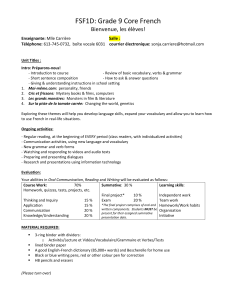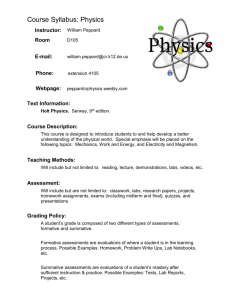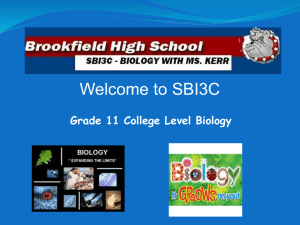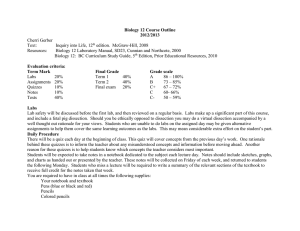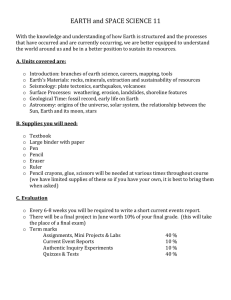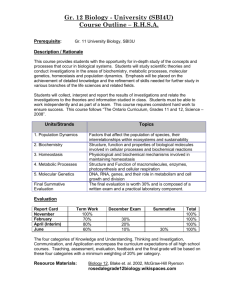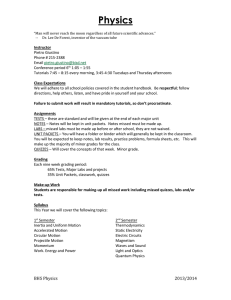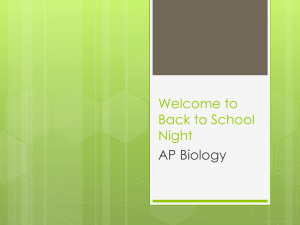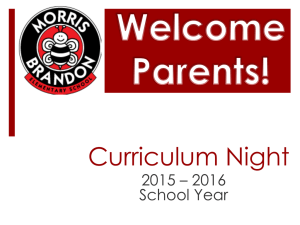Centre Wellington District High School
advertisement
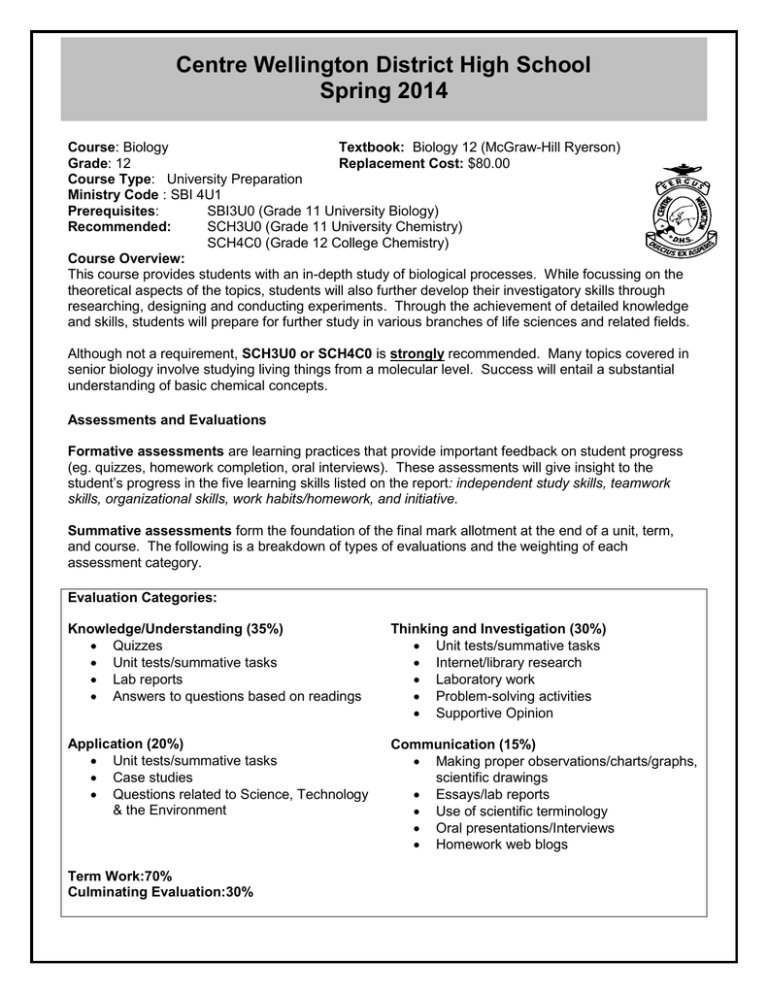
Centre Wellington District High School Spring 2014 Course: Biology Textbook: Biology 12 (McGraw-Hill Ryerson) Grade: 12 Replacement Cost: $80.00 Course Type: University Preparation Ministry Code : SBI 4U1 Prerequisites: SBI3U0 (Grade 11 University Biology) Recommended: SCH3U0 (Grade 11 University Chemistry) SCH4C0 (Grade 12 College Chemistry) Course Overview: This course provides students with an in-depth study of biological processes. While focussing on the theoretical aspects of the topics, students will also further develop their investigatory skills through researching, designing and conducting experiments. Through the achievement of detailed knowledge and skills, students will prepare for further study in various branches of life sciences and related fields. Although not a requirement, SCH3U0 or SCH4C0 is strongly recommended. Many topics covered in senior biology involve studying living things from a molecular level. Success will entail a substantial understanding of basic chemical concepts. Assessments and Evaluations Formative assessments are learning practices that provide important feedback on student progress (eg. quizzes, homework completion, oral interviews). These assessments will give insight to the student’s progress in the five learning skills listed on the report: independent study skills, teamwork skills, organizational skills, work habits/homework, and initiative. Summative assessments form the foundation of the final mark allotment at the end of a unit, term, and course. The following is a breakdown of types of evaluations and the weighting of each assessment category. Evaluation Categories: Knowledge/Understanding (35%) Quizzes Unit tests/summative tasks Lab reports Answers to questions based on readings Thinking and Investigation (30%) Unit tests/summative tasks Internet/library research Laboratory work Problem-solving activities Supportive Opinion Application (20%) Unit tests/summative tasks Case studies Questions related to Science, Technology & the Environment Communication (15%) Making proper observations/charts/graphs, scientific drawings Essays/lab reports Use of scientific terminology Oral presentations/Interviews Homework web blogs Term Work:70% Culminating Evaluation:30% Teaching and Learning Strategies Different instructional strategies are used to provide learning opportunities to accommodate a variety of learning styles, interests and ability levels. Some of these include investigations, independent reading, dissections, problem-solving, research projects, direct instructions, manipulative activities, and writing processes. Expectations – Students are expected to: Attend classes regularly and be punctual. Lates will be recorded and handled according to the school’s attendance policy. If you are late, please quietly take your seat and wait for an appropriate time to discuss matters or retrieve necessary materials Obtain and complete missed class work during absences. It is important to get caught up on missed work before the next class. It is a good idea to have the phone number of TWO classmates who would be willing to fill you in on what was missed, including homework. Do their homework on a DAILY basis. Students can expect to do about 30 minutes of homework every night. Keep an organized, up-to-date notebook including all handouts, labs, and tests Be safety conscious at all times in the lab Plagiarism: Plagiarism is the act of taking ownership of written material or ideas belonging to someone else, whether knowingly or unknowingly. Refer to the CWDHS student handbook for consequence related to plagiarism. Students who send other students their copy of their work, which is subsequently submitted by the second individual (whether knowingly or unknowingly by the donor) will be dealt with in the same manner as the perpetrator. Deadlines: Assignments are due within the first 5 minutes of class. If you are absent on an assignment due date, e-mail an electronic copy to a friend and they can print it and submit it for you. Assignments are due whether or not you are in class. At the teacher’s discretion, you may be given some class time to complete a missing assignment (or alternate assignment). In this case, the assignment (whether complete or not) will be submitted at the end of the period and graded. Reporting of Grades: Estimates of student’s grades will be posted in the classroom using codenames. Report card grades may vary from those posted based on the student’s most recent and consistent achievement as well as their completion and participation in course requirements. Absences Missed Action Student Takes Regular Class Obtain notes, homework, and/or assignments from the teacher or a classmate BEFORE the following class You must follow-up with the teacher and provide confirmation (parent note, parent phone call, or on official field trip or team list) that the absence was excused. Quizzes will be offered to students with legitimate absences. MISSING A TEST IS A SERIOUS MATTER! The teacher must be informed by e-mail PRIOR to the test. In the case of absence, arrangements must be made to complete the experiment as soon as possible. Students not completing compulsory labs / reports will not receive credit for the course, regardless of how marks average out. Students missing a lab where it is not possible to repeat the experiment will be responsible for obtaining their own data from others and following the same expectations as others. Alternative web-based labs may be given at the discretion of the teacher. Quiz Test Lab Contact information Mr. Blair Winch Extra help available at lunch between 12:00 and 12:30 in room 3048. E-mail: blairwinch@ugdsb.on.ca
